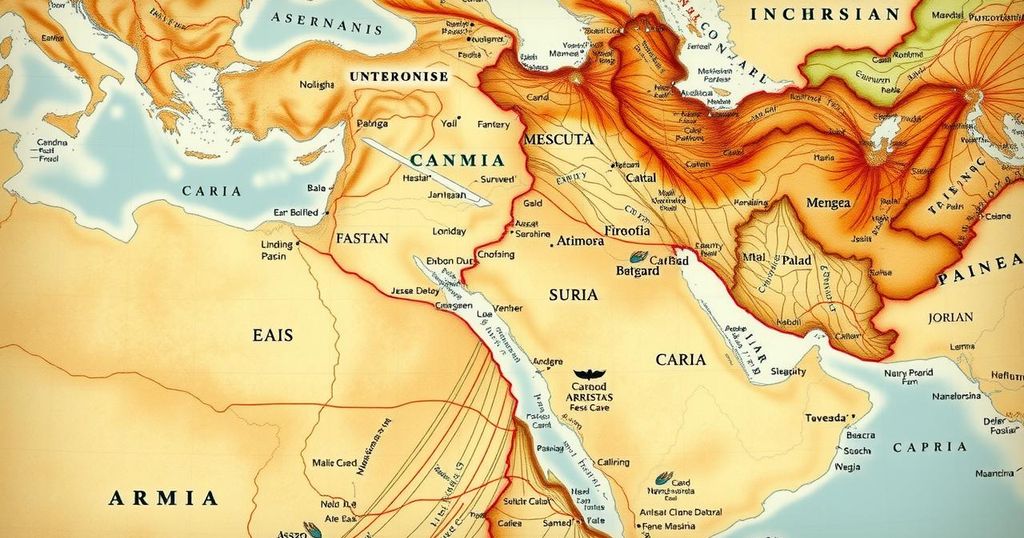Turkey’s Strategic Manipulation of Kurdish Politics in the Middle East

This article discusses Turkey’s strategic use of the Kurdish issue, particularly through Abdullah Ocalan’s call for disarmament, to consolidate regional power. It highlights Turkey’s historical denial of Kurdish autonomy and the implications of Israeli support for Kurdish movements amid evolving power dynamics in the Middle East, particularly in Syria.
Turkey is once again harnessing the Kurdish issue to strengthen its regional dominance, primarily using Abdullah Ocalan, a founding member of the PKK, as leverage. Ocalan has been imprisoned since 1999, and his recent call for disarmament targets not just the PKK but all Kurdish groups, aiming to stifle Kurdish opposition throughout the region.
Historically, Turkey has shown little interest in resolving the Kurdish conflict, which Ocalan states originated from the repression of democratic political avenues by Ankara. For decades, Turkey’s government has systematically denied Kurds even basic territorial autonomy, reflecting an entrenched unwillingness to address their aspirations.
Under Turkish pressure, Ocalan has muted requests for any political frameworks favoring Kurdish self-governance, such as federalism or cultural rights. The PKK’s foundational aim was to establish an independent Kurdistan integrating Kurdish regions from various countries—an aspiration now significantly diminished.
Ocalan’s avoidance of advocating for his own proposed governance model, called democratic confederalism, prompts critical questions about Turkey’s strategic direction and the constraints imposed on Ocalan by the Turkish state. He offers a resolution which fails to challenge the ethnocentric ‘Turkish’ identity embedded in Turkey’s constitution.
In a recent UN address, Israeli Prime Minister Benjamin Netanyahu highlighted the Kurds’ pivotal status in the Middle East. The Kurds’ secular governance model and their historical relations to the Jewish populace position them as a strategic ally against Iranian and other regional threats.
The power dynamics in Syria are also evolving, with the Kurdish-led Syrian Democratic Forces (SDF), the sole liberal-democratic group among the Syrian factions, facing potential suppression from Turkey. While Jihad Abdi asserts that Ocalan’s disarmament call does not pertain to the SDF, Turkish officials contend otherwise.
Turkey’s maneuvering toward Kurdish disarmament is primarily aimed at curbing potential Israeli influence rather than fostering peace. Ankara fears the Kurds’ increasing power can threaten Turkish domination and the Islamist factions Turkey nurtures.
This concern arises particularly after the October 2023 Hamas assault on Israel and amidst Iran’s possible shift to resemble Turkey’s historical ethnic suppression strategies against Kurds. Such developments could exacerbate complexities surrounding Kurdish movements in Iran.
Turkey’s long-term strategy relies on successfully disarming Kurdish factions in Syria and neutralizing their political authority. If their efforts falter, Turkey risks losing its key bargaining chip with Ocalan.
The Kurdish-Israeli alliance could emerge as a vital counterbalance to Turkish and Iranian ambitions within the region, enhancing stability and reshaping the power landscape in the Middle East. The question remains whether Israel will seize this opportunity to forge stronger ties with the Kurds before it is too late.
Turkey’s manipulation of the Kurdish issue illustrates its ongoing efforts to assert control over regional politics by leveraging Abdullah Ocalan. The dynamics in Syria and the broader geopolitical landscape underscore the importance of the Kurdish and Israeli alliance as it relates to countering Turkish and Iranian ambitions. As such, the future of these interactions may significantly influence stability and power relationships in the Middle East.
Original Source: www.jpost.com







